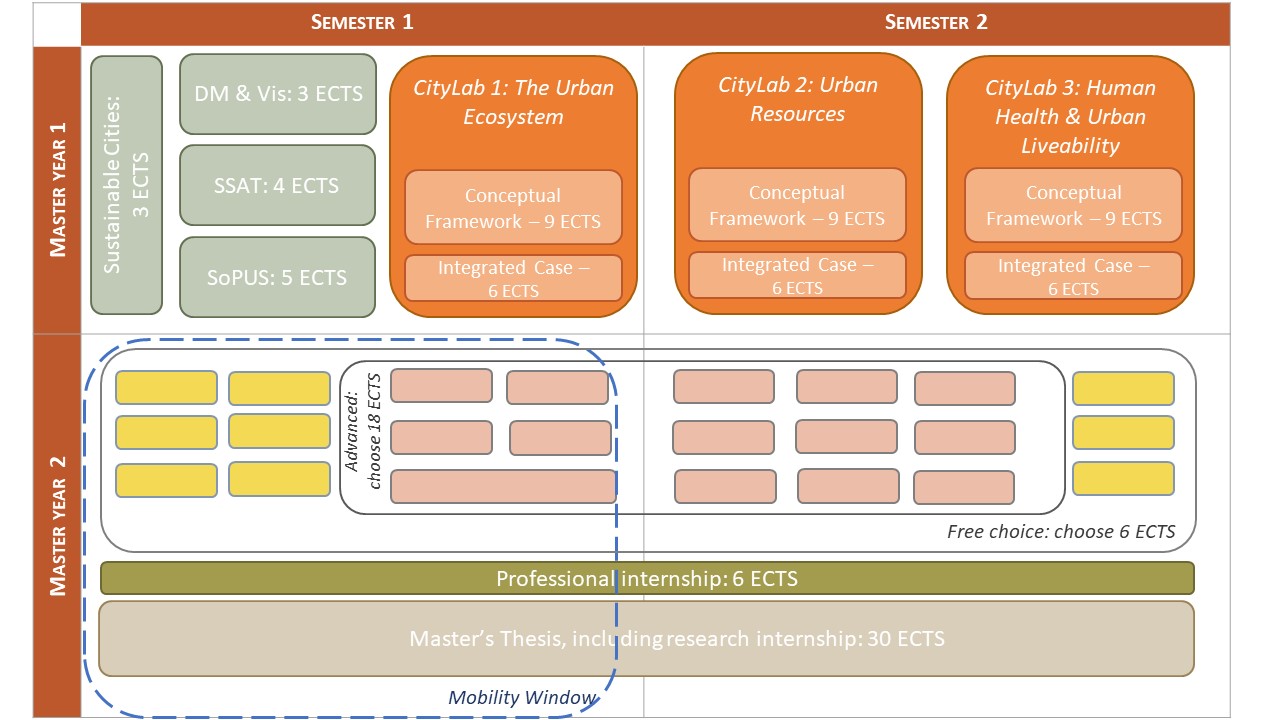Curriculum design
The Master in Bioscience Engineering: Sustainable Urban Bioscience Engineering is a new, unique and international programme jointly organised by University of Antwerp, Ghent University and KU Leuven. It consists of 120 credits spread over two master years. The curriculum is the result of multidisciplinary cooperation across departments, faculties, research groups, institutes and universities.
Figure 1: A schematic representation of the curriculum
The first year consists of four introductory courses that will prepare you for the core of the first year of the master’s programme: the three multidisciplinary projects, called CityLabs: Urban Ecosystem, Urban Resources and Human Health and Urban Liveability.
The second year includes an internship. You may personalise your programme with advanced electives (between 18 and 24 ECTS) and electives of free choice (between 0 and 6 ECTS). A Master’s thesis of 30 ECTS concludes the programme.
The second year also offers the possibility of an international exchange period (Mobility window).
You can find more detail on the first and second year below.
More detailed information on the courses can be found here.
First year
Introductory courses
During the first weeks of the academic year you will be immersed in urban sustainability in the course Sustainable Cities (3 ECTS): central concepts such as ‘sustainability’, ‘city’ and ‘ecosystem’ are discussed, and the most important urban environmental challenges are made tangible through excursions.
In Data Management & Visualisation (3 ECTS), you will follow the process from data collection to data communication and visualisation.
The course Spatial and Sustainability Analysis Tools (4 ECTS) will equip you with in-depth knowledge and hands-on experience in geographic information systems (GIS) and life-cycle-assessment (LCA).
In the course Societal Perspectives on Urban Sustainability (5 ECTS) you are introduced to urban sociology, urban planning, urban economy and relevant legal frameworks, and experience the added value of these complementary disciplines in urban bioscience engineering projects.
The introductory courses are organized by the University of Antwerp.
Citylabs
The core of the first year of the master’s programme consists of the three multidisciplinary CityLabs, with each partner university coordinating one CityLab. More details here.
Second year
Professional internship
The second academic year includes a 25-day internship in a company or a non-academic organisation (6 ECTS). This practical work experience will offer you the opportunity to test and further develop previously acquired knowledge, skills and attitudes. More information on the internship can be found here.
Electives
In the second academic year, you can personalise your study programme by taking elective courses (24 ECTS). Advance electives (between 18 and 24 ECTS) will deepen your understanding of the themes and technologies of the CityLabs. Electives of free choice (max. 6 ECTS) will deepen or broaden your knowledge, attitudes and skills in other subjects. You can also choose courses from the wide range of programmes offered by the University of Antwerp, Ghent University or KU Leuven for these electives of free choice, motivating why this course is important in light of urban environmental challenges and/or applications.
Master’s thesis, including research internship
The final part of the Master’s programme is an individual, multidisciplinary and scientific research project on a particular urban environmental problem that you will carry out as part of the Master’s thesis (30 ECTS) in cooperation with the relevant research groups or in a company/organisation belonging to the programme’s work field. More information on the Master’s thesis can be found here.
Mobility window
You have the opportunity to gain experience abroad by following the first semester in a foreign institution (cf. Mobility Window, max. 30 ECTS) or by doing an internship abroad. More information on the Mobility Window and exchange options can be found here.
